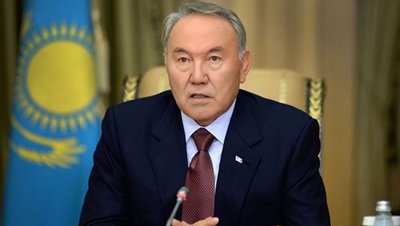3.19.19.
Kazakh President Nursultan Nazarbayev announced his resignation. Nazarbayev had been Kazakhstan's president since April 24, 1990. Nazarbayev signed the decree on March 19.
Nazarbayev announced that he had decided to end his powers as president and that people gave him the opportunity to become the first President of independent Kazakhstan. He continued: “I did everything I could. We worked for Kazakhstan's economy and policy. Recognizing that it is impossible for us to build a weak economy and democratic institutions with poor citizens, we tried to highlight economic development;”
Nazarbayev's resignation points to a controlled transition period rather than a complete withdrawal from politics. Nazarbayev will leave the post of Head of State and continue to chair the Kazakhstan Security Council. Security Council consists of law enforcement agencies that coordinate the activities of central and local executive bodies and control the budget. In May 2018, an amendment was proposed in order to strengthen the Security Council, and it was agreed in the Parliament that the Security Council resolutions were binding on Kazakhstan's state institutions. Nazarbayev will also head the parliamentary political party, Nur Otan.
In 2000 Nursultan Nazarbayev said : “I will serve the people of Kazakhstan until the end. I consider it to be my duty to continue the transformations in the country and raise a new generation,”Along with certain titles awarded for him , he had the authority to contribute to the development of life-long state, domestic and foreign policy, and national security. It is estimated that Nazarbayev will follow the development of the country as an experienced leader, as the Singapore Founder President Lee Kuan Yew did after resigning from his post. Thus, when a new Head of State takes office in Central Asia, it is considered that he wants to avoid hard changes.
Nazarbayev, who will be 79 years old this year, has been the President of Kazakhstan since 1990. In the early elections held in 2015, he was re-elected as President for the fifth time, with a rate of 97.75%.
On March 20, the President of the Senate, Kassim-Jomart Tokayev, replaced the President Nursultan Nazarbayev. Tokayev will continue this duty until the presidential elections in 2020. Born in 1953, Tokayev has a long and successful career that started in the USSR. After graduating from the Moscow State Institute of International Relations in 1975, he worked in Singapore for a long time and until 1991 in the US Embassy in Beijing. Tokayev, who has assumed the position of Foreign Ministry in the years following the independence of Kazakhstan, has been among Nazarbayev's close colleagues for many years. Tokayev served as Prime Minister from 1999 to 2002. He is an experienced statesman who served as President of the Senate from 2007 to 2011 and as General Manager of the Geneva Office of the United Nations from 2011-2013. Lastly, he was the President of the Senate since October 16, 2013. In addition to his native Kazakh language, Tokayev speaks Russian, English, French and Chinese.
The presidency of Senate, led by Tokayev, was chosen by Nursultan Nazarbayev’s eldest daughter, Dariga Nazarbayeva, who has been in politics for a long time.









